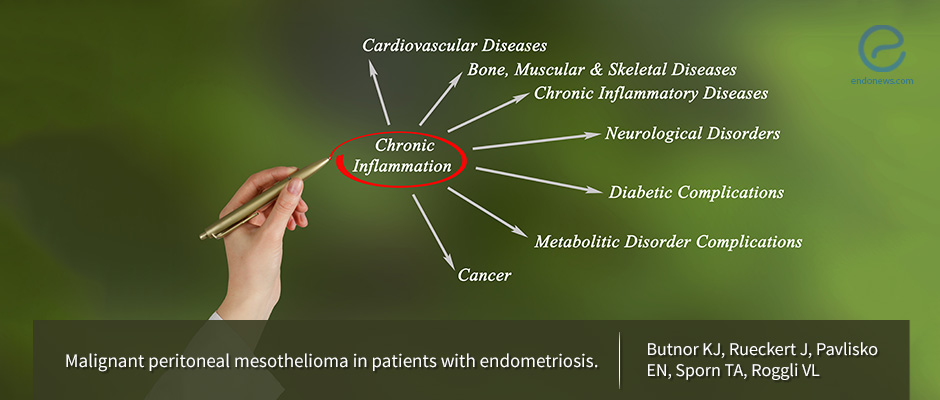The association of endometriosis and peritoneal malignant mesothelioma
Jan 25, 2019
Peritoneal malignant mesothelioma rarely occurs in women with endometriosis.
Key Points
Highlights:
- In women with endometriosis, malignant mesothelioma has only been observed in the peritoneum and not in other serosal cavities.
Importance:
- Chronic serosal inflammation secondary to endometriosis may be an inducing factor in rare cases of malignant mesothelioma of the peritoneum.
What's done here:
- The surgical pathology files of Duke University Health System, Durham, North Carolina and the consultation files of one of the study authors were reviewed for cases of malignant mesothelioma in females with and without endometriosis.
Key Results:
- Malignant mesothelioma occurs rarely in patients with endometriosis.
- Six females with malignant mesothelioma and peritoneal and/or adnexal endometriosis were identified.
- Malignant mesothelioma histological types included five epithelioid and one biphasic types.
- The median age at the time of diagnosis for women with endometriosis (44.5 years; range=29–55 years) was significantly lower than the median age of women with peritoneal malignant mesothelioma who did not have endometriosis.
- Two of the patients had a history of asbestos exposure.
- Two of the six women were never-smokers, two smoked ≤1pack per day, and the smoking status could not be determined in the other two cases.
Limitations:
- Conclusions regarding the risk of women with endometriosis in the general population developing malignant mesothelioma can’t be drawn based on this study.
- The medicolegal consultative nature of the database and the potential bias related to possible subclinical endometriosis in the control group (women without recognized endometriosis).
Lay Summary
Endometriosis is well known to cause chronic inflammation of the serosa and incite mesothelial hyperplasia. Although multilocular peritoneal inclusion cysts and well-differentiated papillary mesothelioma were reported to be associated with endometriosis, the association of malignant mesothelioma has not been reported before.
Butnor et al. reported 6 cases of peritoneal malignant mesothelioma arising in the setting of endometriosis. Their study which is the first report of malignant mesothelioma in women with endometriosis has recently been published in the Journal of Clinical Pathology in November 2018.
The researchers identified 6 females with malignant mesothelioma and peritoneal and/or adnexal endometriosis from the surgical pathology files of Duke University Health System and the consultation files of one of the study authors.
Histological types included five epithelioid and one biphasic malignant mesothelioma. The median age at the time of diagnosis of women with endometriosis (44.5 years; range=29–55 years) was significantly lower than the median age of women with peritoneal malignant mesothelioma who did not have endometriosis. Two of the six patients had a history of asbestos exposure. Two of the six women were never-smokers, two smoked ≤1pack per day, and the smoking status could not be determined in the other two cases.
Women with peritoneal malignant mesothelioma were found to a higher prevalence of endometriosis (5.8%) than that has been reported in the general female population (2%–3%). The proportion of peritoneal malignant mesothelioma in women that have asbestos exposure is lower in contrast to most cases of malignant mesothelioma. Aside from asbestosis, it has also been reported to develop in the setting of such chronic inflammatory conditions of the peritoneum as Crohn’s disease, familial Mediterranean fever-associated recurrent peritonitis, and severe recurrent diverticulitis. The mechanism by which chronic serosal inflammation triggers malignant mesothelioma is not yet clear but inflammasome activation appears to play an important role. Oestrogen receptor-β, which is increased in endometriotic tissue, enhances inflammasome-mediated interleukin-1β production that regulates mesothelial cell proliferation.
The current study concluded that chronic serosal inflammation secondary to endometriosis might be a possible inducing factor in rare cases of malignant mesothelioma of the peritoneum.
Research Source: https://www.ncbi.nlm.nih.gov/pubmed/?term=29794065
endometriosis mesothelioma peritoneum serosa asbestosis chronic inflammation Crohn`disease FMF diverticulitis ER IL-1beta inflammasome

